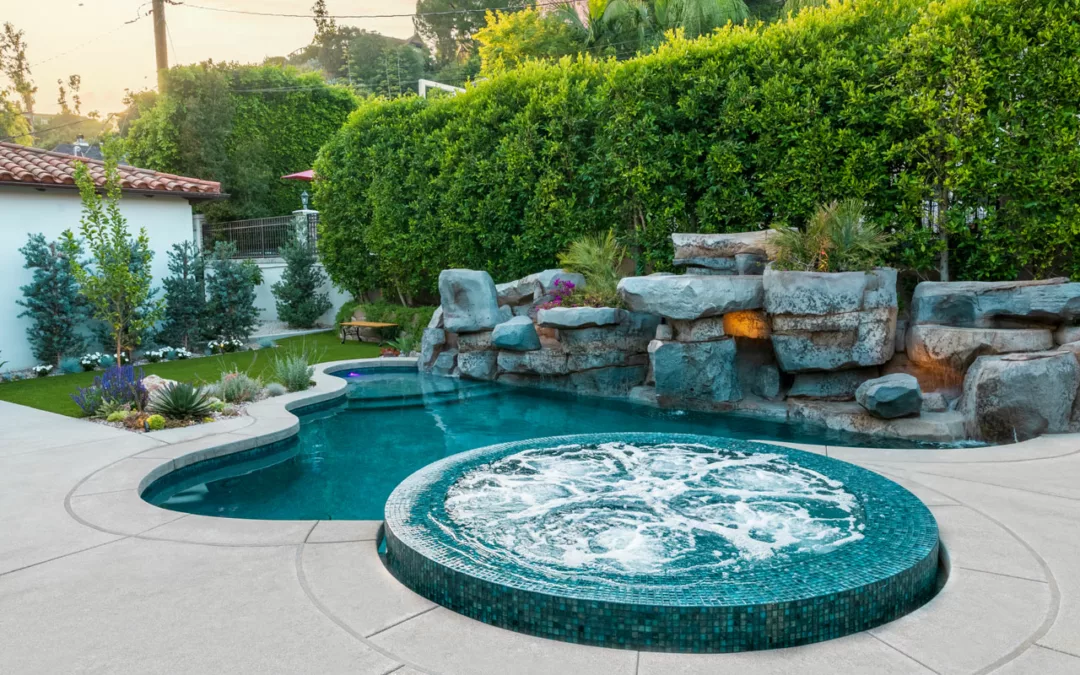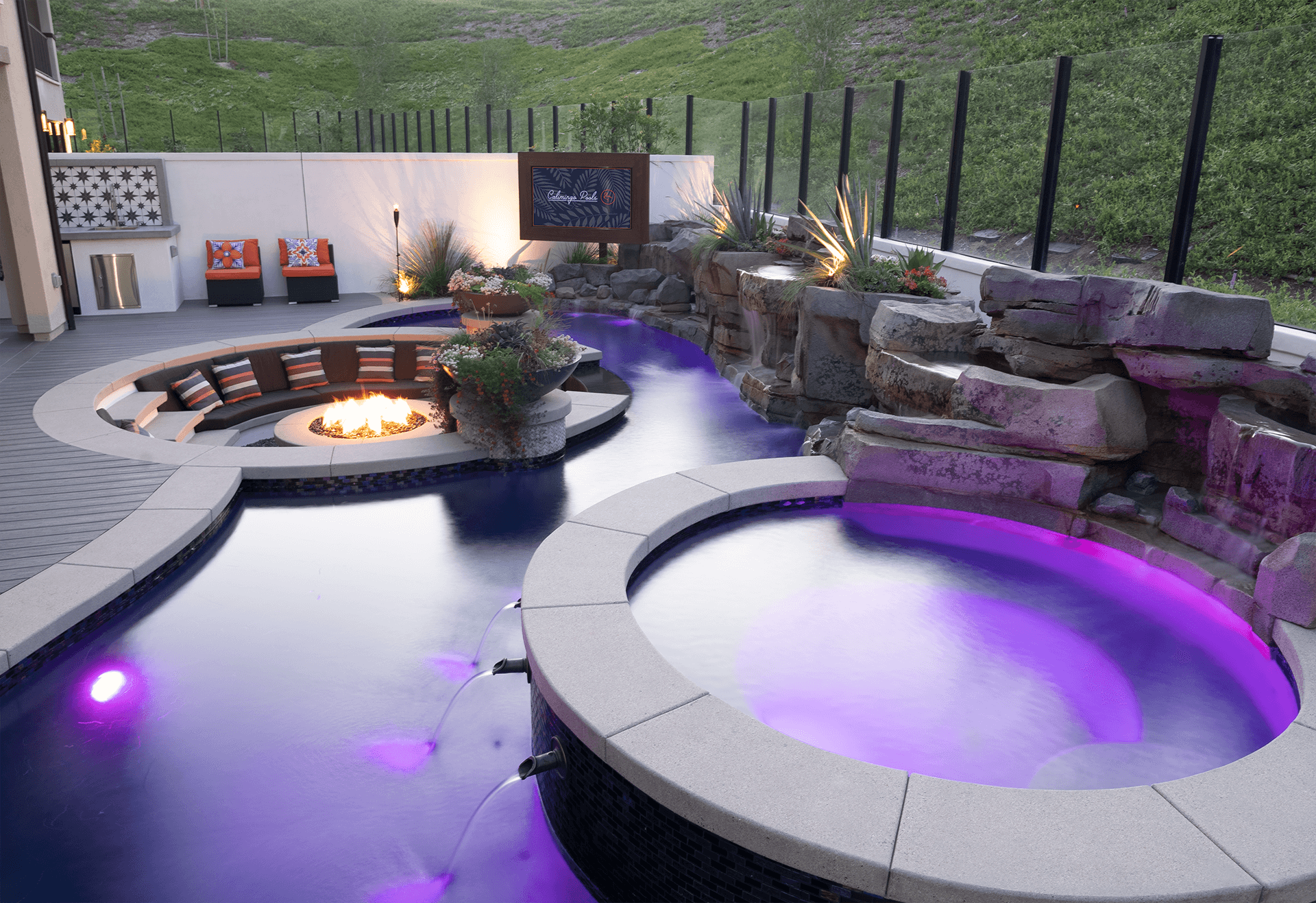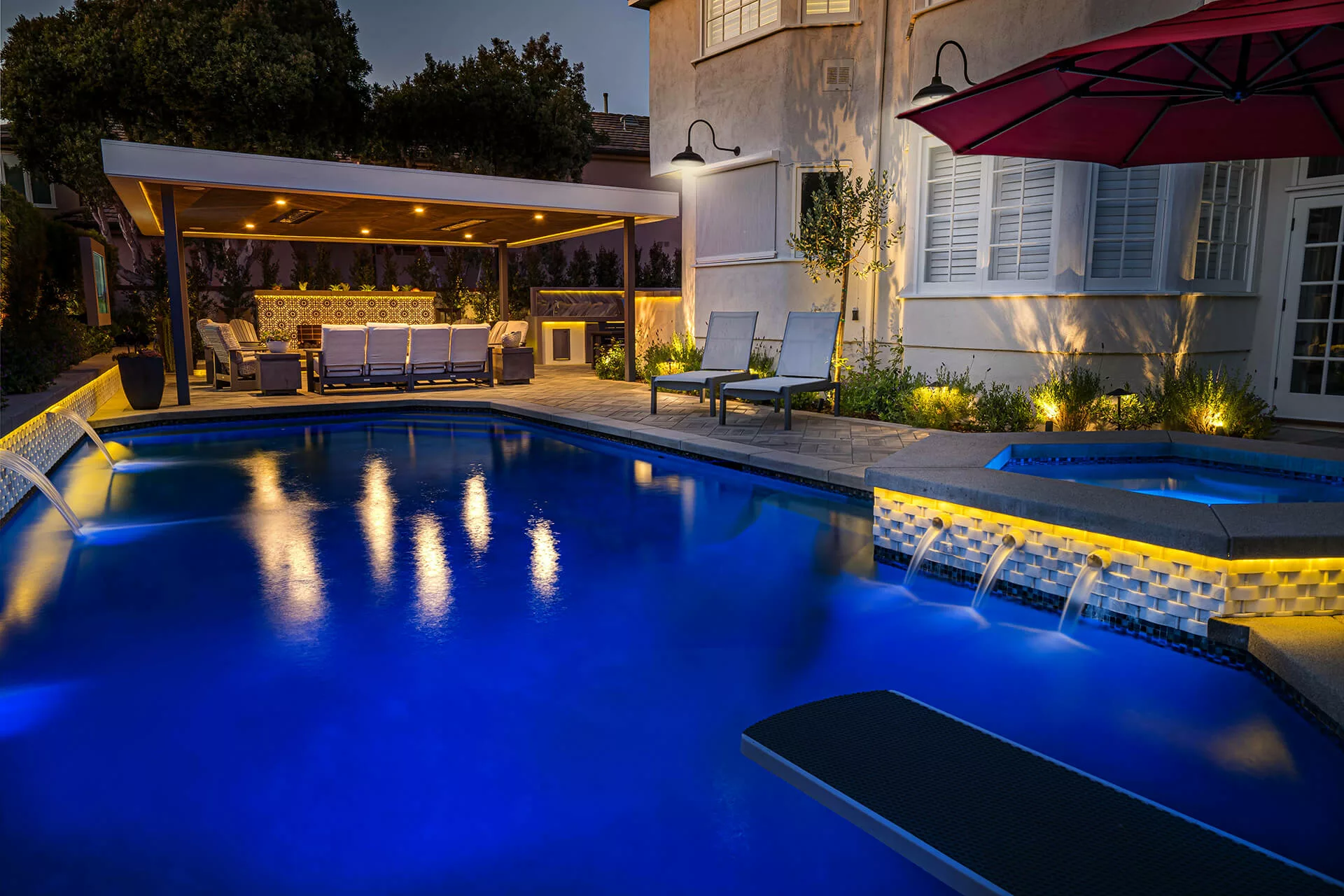The moderate winter temperatures in Southern California mean it’s swim time all the time, as long as you’ve got the proper equipment. With the right type of pool water heater, you can keep your backyard a welcoming paradise year-round. A professional pool installer in Orange County can help determine the pool heater cost for your specific setup.
While you have several options, electric and gas pool heaters are the most popular way to take the edge off on cooler days, ensuring your pool remains your favorite way to relax. Confused over electric pool heater vs. gas? No worries: Calimingo has your back.
Electric Pool Heater Cost vs. Gas
Determining which type of pool heater is better can be controversial since many factors play a role in the decision-making process, such as your preferred temperature and how often you plan to use your pool in the winter months.
When you weigh the pros and cons of electric and gas pool heaters, there’s rarely a clear winner. Ask a few pool professionals, and you’ll likely get several different answers. Some professionals don’t recommend gas pool heaters, while others feel they’re comparable to their electric counterparts.
Ideally, you would be able to decide based solely on the price of the pool heating system. However, because numerous factors are involved, it’s not a straightforward decision. It must be analyzed on a case-by-case basis.
How Much Does It Cost To Keep Your Pool Warm in Orange County, California?
Determining how much it costs to keep your pool warm in Orange County depends on several factors. When it comes to actual equipment, gas heaters tend to cost less than electric heaters. However, they do have higher installation costs. Another issue is whether you have a natural gas pipeline on your property. If you don’t, you’ll need to buy and install one or get a propane tank.
So when considering a pool heater cost, you must consider the equipment and installation costs. With a gas pool heater, you are looking at total costs of $3,000 to $4,000. That breakdown equates to $1,500 and $2,500 for equipment plus installation fees. On the other hand, electric pool heaters can be far pricier: installation will cost you $3,500 for the installation alone.
Beyond equipment and installation, you need to consider running costs. This cost will fluctuate depending on the current market prices. Natural gas heaters’ running costs are around $200 to $400 monthly, but that can change with volatile prices. In comparison, the average running costs for electric pool heaters tends to run between $100 and $600 per month.
What Affects Pool Heater Cost?
Before deciding which pool heater is suitable for your swimming pool, you must consider the details of your specific project.
It’s important to understand that the British thermal units it produces is a major determining factor of which pool heater you need and its cost. The Btu is a measurement of how much heat is produced. You’ll want a heater with a higher Btu rating to get your swimming pool warmer faster.
One Btu is the energy it takes to increase the temperature of 1 pound of water by 1 degree Fahrenheit. Pool heaters with higher Btu ratings are therefore more efficient at heating.
When it comes to pool heater cost, you’re looking at 1 cent to 4 cents per Btu.
Pool Size
The size of the pool heater you need will depend on how large your pool is. While it’s easy to focus on the pool’s dimensions, including depth, the most crucial consideration is its capacity.
For example, with a 20,000-gallon pool, you will use 166,000 Btus to generate a few extra degrees over a few hours. Therefore, the actual capacity of your pool and the desired temperature will significantly influence the size of the pool heater you purchase.
Pool Type
The type of pool that you have will also influence the pool heater installation costs. Installing a pool heater for in-ground pools will be more costly since the pipes must be buried underground. This is especially true for pool heaters being installed after pool construction. If you’re looking at putting an in-ground pool in your backyard, your best option is to preemptively install the piping for a pool heater to save on installation costs down the road.
Geographic Location and Climate
Your pool location will also influence which type of pool heater you need. Pools in colder climates will need a stronger pool heater to extend the time the swimming pool can be used, a major factor in the electric pool heater vs. gas debate.
However, an average-sized pool heater is sufficient in Southern California, given the moderate temperatures in the winter months. If you want to keep your pool open year-round, a bigger heater can offset the cooler air.
Pool Heater Type
As mentioned, each type of pool heater has its pros and cons. Here are some of the key things to know about each type.
Electric Pool Heaters
Electric pool heaters are one of the most straightforward pool heating systems. An electric pool heater uses a heater coil to warm the water that passes through the system. Because it’s powered entirely by electricity, it makes a good pool heating system year-round since it’s not influenced by external temperature.
However, running entirely on electricity means they can be expensive to operate. Likewise, they can struggle to maintain constant heat.
Compared to other pool warming systems, electric pool heaters are easy to install and easy to operate. It’s even possible to purchase a smart system that can sync to your smartphone via an app that lets you control any aspect of the system, including startup and temperature.
It should also be noted that electric pool heaters are easier to maintain than other options available. Likewise, they’re simple to repair, and replacement parts are often cheaper than parts for gas swimming pool heaters.
Gas Pool Heaters
Gas pool heaters are more popular, because they cost less to run than electric heaters. Additionally, they can heat the pool more quickly, allowing you to run them when you want to take a dip instead of all the time or hours before you’re ready to swim.
You can also keep your pool warmer with a gas pool heater. A warmer pool can be especially beneficial for pool owners with joint conditions or chronic pain as it can help ease the discomfort.
A downside to gas pool heaters is the higher upfront cost. Installing a gas heater can be much more expensive, especially if you don’t have an existing natural gas line on your property. In such instances, you will either need to invest in getting a line laid or install a large propane tank on your property.
Solar Pool Heaters
You’ll also find that solar pool heaters are an option. Solar pool heaters cost nearly the same as an electric or gas pool heater, ranging between $3,000 and $4,000.
While solar heaters can cost less to run, several cons must be considered. A solar pool heating system will require specific placement to maximize sunlight exposure to generate enough energy to heat the pool. Additionally, a solar heater will take much longer to heat the water with no temperature guarantee, which could keep you from enjoying your Orange County pool year-round.
Other Considerations When It Comes to Your Pool Heater
When it comes to getting a new pool heater, additional factors beyond what we have already discussed can influence the overall cost.
— Permits: Remember that if you’re digging or remodeling to install your pool heater, you may need to pay for a permit to complete the work.
— Old heater removal: If you have an existing system that cannot be repaired, you’ll need to pay for labor to remove it before installing the new system.
— Hookup installation: Factor in the price of installing new gas lines, tapping into existing gas lines, or purchasing propane for your pool heating system.
— Operating costs: The price of energy is constantly fluctuating. You’ll need to consider how much energy you’ll use with your pool heating system and its annual costs.
— Winterization: If you live in a colder climate, you’ll also want to consider how much it will cost to protect your system during the winter. Failure to winterize properly could result in cracked pipes and extensive spring and summer repairs.
— Related projects: Planning to install an inground pool or resurface your pool soon? Time your pool heater installation simultaneously to minimize labor costs.
— Maintenance: Bacteria can thrive in warm water, so it’s essential to factor in the cost of upping your maintenance schedule to keep your family and friends safe and healthy in the pool.
While the cost of installing a pool heater can be overwhelming, don’t forget you can take measures to save on costs in the long run. Some of the things you can do include: choosing an efficient pool heater model; keeping up with regular pool heater maintenance; using the heater wisely, running it only as much as needed to heat your pool; and covering your pool with a solar pool cover when not in use to help maintain the water temperature
Do I Need To Hire a Professional for Pool Heater Replacement?
It’s tempting to replace your pool heater yourself. However, given that electric and gas pool heaters are the most popular options for heating your pool, pool heater installation and replacement is a job best left to a professional.
These systems require careful knowledge and understanding of electrical systems and working with natural gas pipelines. If you’re tapping into a natural gas line for your pool heater, there’s a strong chance your municipality will have strict regulations over the installation.
Your best option is to work with a trusted Orange County pool contractor to discuss which pool heater suits your specific project and help you install it. Our team at Calimingo Pools is ready to help you make your backyard the year-round paradise it’s meant to be.




